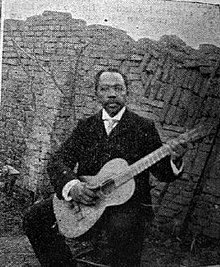Gabino Ezeiza
This article contains promotional content. |
Gabino Ezeiza | |
|---|---|
 | |
| Background information | |
| Birth name | Gabino Ezeiza |
| Born | February 3, 1858 |
| Origin | |
| Died | October 12, 1916 (aged 58) Córdoba Province, Argentina |
| Genres | payador |
| Occupation(s) | Musician, Songwriter |
| Instrument(s) | Vocals, guitar |
Gabino Ezeiza, nicknamed "Black Ezeiza" (February 3, 1858 – October 12, 1916), was an Argentine musician.
Ezeiza was invincible, the most famous in the art of payar, both in land and in Uruguay. His counterpoint became famous and presents the sustained Paysandú mented with oriental singer Juan de Nava, who was surrounded by a halo of prestige won in many of those who knew tangles succeed. The encounter was witnessed by one of the most numerous audiences that remember and, with the state Public eastern side, Ezeiza improvised there what would be the famous song Heroic Paysandu, with which beat Eastern payador, becoming one of the two payadores largest in history (along with Santos Vega ). Another memorable was his humor which was to stage a theater of Pergamino, Province of Buenos Aires with the famous Paul J. Vázquez, in 1894. It is alleged that plays left, made possible because the Singer was not as rough as they said certain "intellectuals". Gardel and Razzano met him in political committees, like almost all the minstrels of the time, and that knowledge was treated friend in the wheel of the popular Café de los Angelitos. At his death, the duo sang in his honor Heroic Paysandu, which years later led to record Gardel.[1]
References
- ^ SINGER OF THE HISTORIC SAN TELMO translated website
